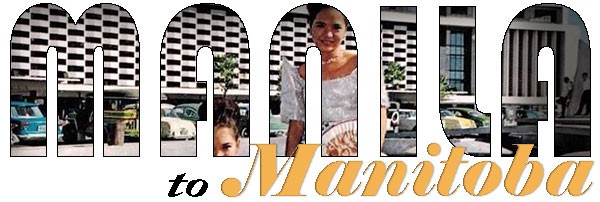I just came back from the printer. Yes, the printer.
Volume One of the From Manila to Manitoba series is at the printer.
Looking back, after 3 years of countless hours combing through the archives and library, conducting interviews, writing (and re-writing), editing, designing (and re-designing), I want to share some of my experiences about the triumphs and trials of this process.
The project began, as you may already know, as a way of celebrating the 50 year anniversary of the Filipino-Canadian community in Winnipeg in 2009. A community concert was planned as well as various events throughout the city. A group of us Filipino-Canadian students and academics thought it would be more fitting to create something more substantive and lasting by gathering oral histories for future generations. It was a feat never done. It was also a huge dream; and a way for us ‘young’ people to give back.
Working on this project over the years, I’ve learned the REAL complexities of presenting and interpreting history. I can say I truly understand the sensitivities involved with gaining a special trust to not only learn of one’s life and experience, but also of handling one’s guarded memory of a time since gone. There is much context to be found between the interviewer and the informant. Somehow, in the intimacy of investigation, agendas and biases, jealousies and conflicts exert themselves into this relationship. As curator, it was my job to navigate this – something I’ve never done before with so much at stake and at such a large scale.
When embarking on an oral history project in an ethnic community as young and as large as the Filipino-Canadian one is in Winnipeg, I urge oral historians to consider:
TRUST
Why do you want to work with this community? Why do you feel you are worthy of being entrusted with their life narratives? Are you aware of how your work will affect their children and children’s children?
GOALS
What will you do with these oral histories? Who will it benefit? Who might it hurt?
PARTNERS
If this project requires needed partnerships, how will you communicate your goals with your stakeholders? Are you prepared to agree or disagree with them?
WHO
Who will you interview? How will you gather your informants?
CONTEXT
How will you interpret the oral histories gathered?
Will your informants agree with your interpretation? Does this matter to you?
PUBLIC
How will you share what you’ve learned from them?
Each of these questions have entered my mind at certain stages of the project. I tried my absolute best to stay true to our objectives of honouring the community and the generations to follow with an honest and fair interpretation. It’s never been my goal to find the ‘truth’, but merely present what ‘truths’ are circulating about atop in an ivory tower or in the community at the grassroots. I guess I am searching for the middle. I feel it’s a responsibility I take very seriously.
To sum up, I need to borrow some words that have essentially become my motto as a scholar. They arrived from an Aboriginal Education conference I attended not too long ago. A First Nations’ scholar opened his talk on residential schools with the apt words:
“I’m not here to pimp out my family’s story.”
Short, kurt, and very true. I’ve learned that there is a public and a market that is in need of an experience to exploit (and dare I say, pity). I’ve lived as a Canadian all my life, but it’s the Filipino experience that has been arduous. I’ve grown in tandem with the then small community I will always be a part of. I share these stories so this journey will make a little more sense to all Canadians hoping to walk this journey together.
